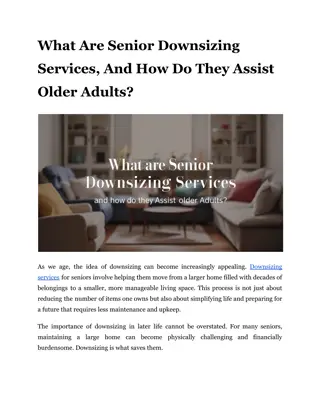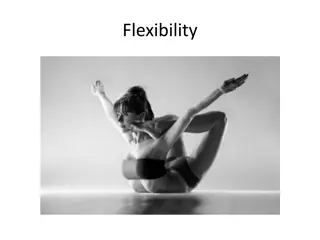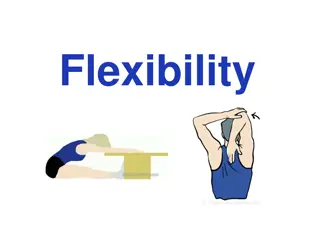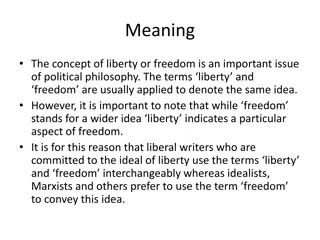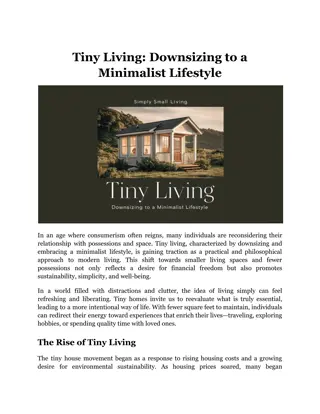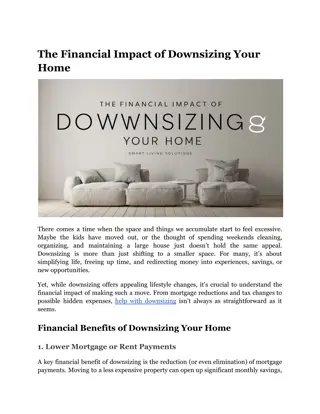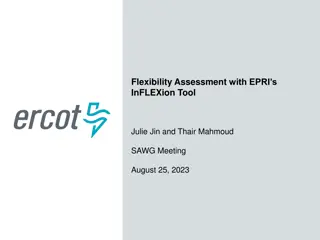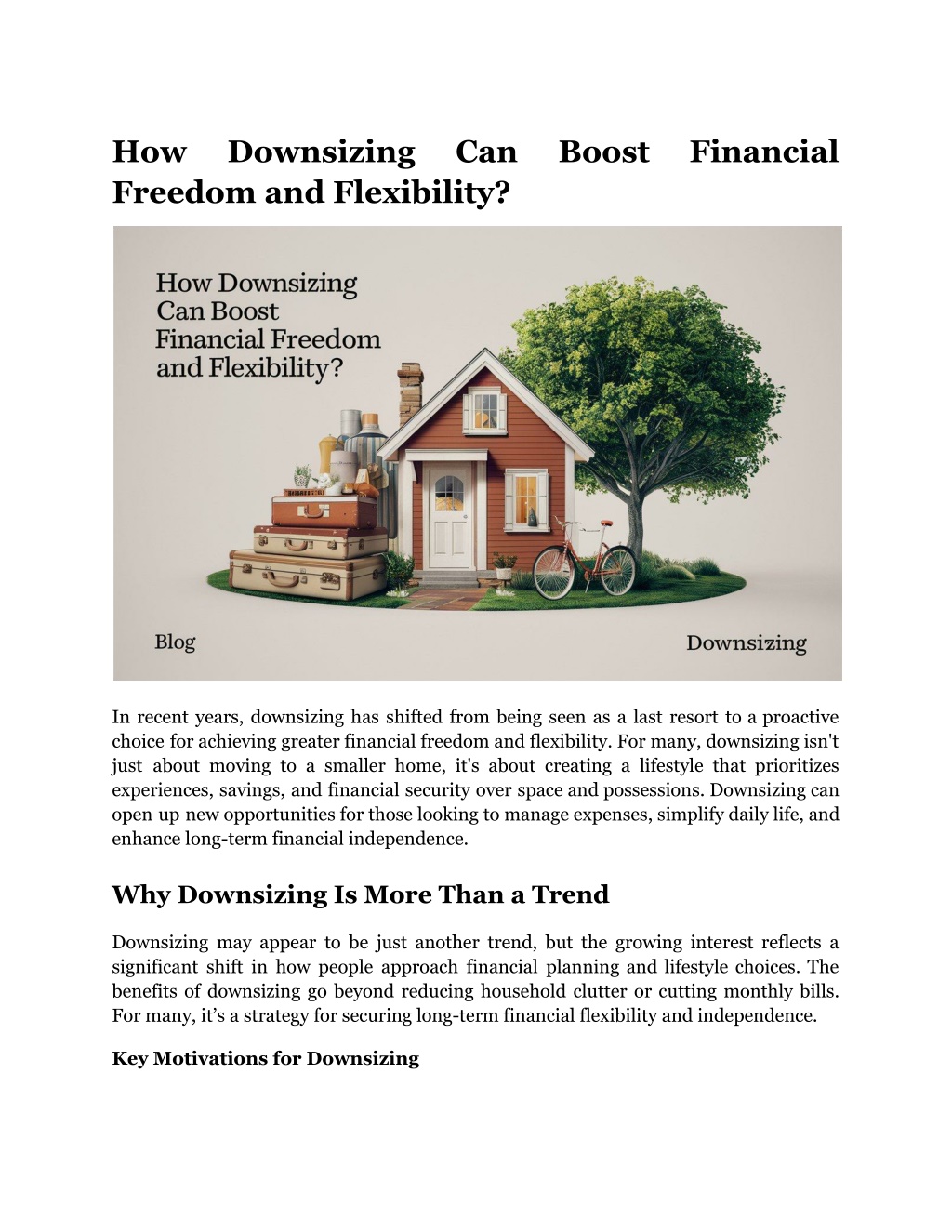
How Downsizing Can Boost Financial Freedom and Flexibility?
Discover how downsizing your lifestyle can unlock financial freedom, boost flexibility, and simplify your life.
Download Presentation

Please find below an Image/Link to download the presentation.
The content on the website is provided AS IS for your information and personal use only. It may not be sold, licensed, or shared on other websites without obtaining consent from the author. Download presentation by click this link. If you encounter any issues during the download, it is possible that the publisher has removed the file from their server.
E N D
Presentation Transcript
How Freedom and Flexibility? Downsizing Can Boost Financial In recent years, downsizing has shifted from being seen as a last resort to a proactive choice for achieving greater financial freedom and flexibility. For many, downsizing isn't just about moving to a smaller home, it's about creating a lifestyle that prioritizes experiences, savings, and financial security over space and possessions. Downsizing can open up new opportunities for those looking to manage expenses, simplify daily life, and enhance long-term financial independence. Why Downsizing Is More Than a Trend Downsizing may appear to be just another trend, but the growing interest reflects a significant shift in how people approach financial planning and lifestyle choices. The benefits of downsizing go beyond reducing household clutter or cutting monthly bills. For many, it s a strategy for securing long-term financial flexibility and independence. Key Motivations for Downsizing
1. Financial Efficiency: Lower mortgage payments, utilities, and maintenance costs can free up a significant portion of monthly income. 2. Reduced Maintenance: Smaller spaces require less upkeep, allowing for more free time and fewer maintenance expenses. 3. Flexibility for Future Moves: A smaller, more manageable living space can offer greater freedom to relocate when needed, whether for job changes, family considerations, or lifestyle preferences. 4. Eco-Friendly Living: Downsizing often means using fewer resources, which can reduce your environmental footprint. Financial Benefits of Downsizing A smaller home can offer financial freedom by reducing both immediate expenses and long-term financial commitments. Here are several ways downsizing can impact finances positively: 1. Lower Monthly Expenses Moving to a smaller home typically results in lower mortgage or rent payments, insurance costs, and property taxes. Expense Type Before Downsizing After Downsizing Potential Savings Mortgage/Rent $1,500/month $1,000/month $500/month Utilities (Electric, Gas) $200/month $125/month $75/month Property Tax $300/month $200/month $100/month Home Insurance $100/month $70/month $30/month Total (Approx.) Savings $705/month By downsizing, it s possible to save upwards of $700 per month savings that can be allocated towards retirement funds, travel, or investments. This reduction in fixed expenses can lead to substantial annual savings, allowing for greater financial flexibility.
2. Opportunity to Pay Off Debt Faster The reduced housing costs can be used to pay down high-interest debts such as credit cards, student loans, or car loans. By redirecting monthly savings into debt repayment, downsizers can reduce their debt burden faster, avoiding years of interest payments and improving their financial outlook. 3. Increased Savings for Retirement For those nearing retirement, downsizing can help increase contributions to retirement accounts like IRAs or 401(k)s. It can also free up funds for emergency savings or healthcare, both of which become increasingly important as people age. Building Flexibility with a Downsized Lifestyle Financial freedom is about more than just reducing expenses. Downsizing can provide a level of flexibility and mobility that s hard to achieve with larger financial commitments tied to a big house. Simplifying Moving and Relocating Smaller homes are typically easier to sell, making it simpler to move when personal or professional changes occur. The flexibility to relocate without a complicated selling process or excessive financial loss is a huge advantage in a fast-paced, mobile economy. Flexibility in Lifestyle Choices With fewer financial obligations, downsizers often have more resources for things that improve quality of life. This could mean: Traveling more frequently: With fewer monthly expenses, downsizers often have more disposable income for vacations and travel experiences. Pursuing hobbies and passions: Hobbies like photography, cooking, or gardening become more affordable when resources aren t tied up in housing. Investing in personal development: Freed-up income can go towards educational courses, fitness memberships, or professional certifications.
Downsizing Challenges and How to Overcome Them Downsizing isn t without its challenges. For many, the idea of moving to a smaller space can feel restrictive. However, these hurdles can be addressed with thoughtful planning and practical solutions. Emotional Attachment to Belongings Letting go of items collected over the years can be challenging, especially when they have sentimental value. To ease this process, consider: Digital Documentation: For items that have sentimental value, take photos to preserve the memory without keeping the physical item. Selective Downsizing Assistance: Focus on keeping a few meaningful items instead of everything. Hiring a downsizing consultant can also help streamline the process. Donation and Repurposing: Donate items to meaningful causes, giving them new life and purpose in someone else s hands. Limited Space for Hosting For those who enjoy entertaining or have family gatherings, a smaller home may feel restrictive. Solutions include: Flexible Furniture: Invest in modular furniture that can be rearranged easily for hosting events. Outdoor Spaces: If downsizing to a condo or smaller house with a patio or communal area, use these spaces to host gatherings. Alternative Venues: Hosting events in parks, rented spaces, or even at friends homes can provide a compromise that doesn t require as much space. Adjusting to a Minimalist Lifestyle Adapting to a lifestyle with fewer belongings takes time, but the benefits of a simplified space often outweigh the initial adjustment period. By focusing on essentials and prioritizing items that add value, downsizers can create an organized and satisfying living environment.
Downsizing Strategies to Maximize Benefits Successfully downsizing requires more than just moving to a smaller space; it s about planning to maximize financial and lifestyle benefits. Here are some strategic tips: 1. Create a Clear Plan Before downsizing, assess your needs and goals. Determine what you re hoping to achieve (e.g., reduced expenses, simpler living), and make a list of the essential features you need in a smaller home. 2. Research Housing Options Explore different housing types, such as condos, townhomes, or smaller single-family homes, to find the best fit for your lifestyle. Consider factors like HOA fees, proximity to amenities, and future resale value. 3. Consider Location Carefully Choosing a location that fits your lifestyle can increase the enjoyment and convenience of your new home. Proximity to public transportation, healthcare facilities, and social amenities can add value and reduce transportation costs. 4. Leverage Services Downsizing doesn t have to be done alone. Professional home downsizing assistance services can assist with organizing, packing, and even decluttering, making the process less overwhelming and more efficient. These services can also offer guidance on repurposing, donating, or selling items that won t make the move with you. 5. Make Smart Furniture Choices Investing in versatile, multi-functional furniture can help make the most of a smaller space. Look for pieces that can serve multiple purposes, like storage ottomans, fold-out desks, or wall-mounted shelves. Is Downsizing Right for You? Downsizing is a big decision that requires evaluating personal and financial priorities. Here s a table to help assess whether downsizing aligns with your goals:
Question Consideration Do monthly expenses? you want to reduce Downsizing can lower housing costs, freeing up more disposable income. Are retirement? you planning for A smaller home can reduce financial burdens, helping you save more for retirement. Is flexibility important to you? Downsizing makes it easier to relocate if your life circumstances change. Are you ready to declutter and simplify? Downsizing means fewer belongings, but it can lead to a simpler, more organized life. Do experiences over space? you prioritize If so, the savings from downsizing can go towards travel, hobbies, and leisure. Final Thoughts Downsizing is more than just a cost-saving measure; it s a lifestyle choice that can improve financial health and create new opportunities for personal freedom and flexibility. By freeing up resources tied to housing costs, downsizers can focus on building financial independence, pursuing passions, and enjoying a less complicated lifestyle. If you re considering downsizing, remember that there s a wealth of downsizing help available to make the process smoother and more rewarding. Site Article: How Downsizing Can Boost Financial Freedom and Flexibility?






